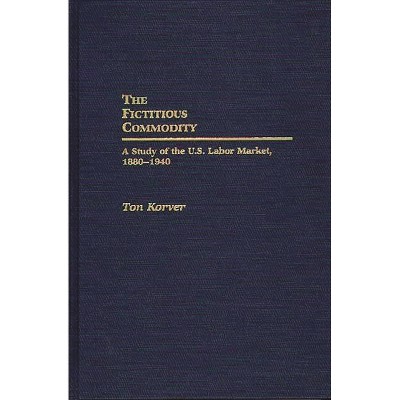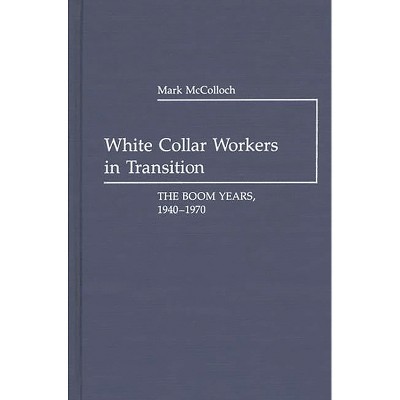Sponsored

A Workforce Divided - (Contributions in Labor Studies) by Leslie a Schuster (Hardcover)
In Stock
Sponsored
About this item
Highlights
- In this study of the life and work of Saint-Nazaire's shipbuilding workers in the 30 years before World War I, Schuster shows that the consequences of industrial production for workers differed sharply according to their resources and experiences.
- About the Author: LESLIE A. SCHUSTER is Associate Professor of History at Rhode Island College.
- 248 Pages
- History, Europe
- Series Name: Contributions in Labor Studies
Description
About the Book
In this study of the life and work of Saint-Nazaire's shipbuilding workers in the 30 years before World War I, Schuster shows that the consequences of industrial production for workers differed sharply according to their resources and experiences. She details the competing identities and divergent values maintained by shipbuilding workers, demonstrating that they were fostered by the interaction between state programs, industrial production, and the traditions pursued in the local realm. Third Republic economic policies for shipbuilding promoted unemployment and worker dependence on state officials over union leaders, and the uneven application of capitalist methods of production meant multiple workplace experiences that further undercut association.
A workforce composed of industrial workers and agricultural producers brought markedly different priorities to the workplace. Urban-dwelling industrial workers proved dependent on shipbuilding, while workers commuting from La Grande Bri^D`ere, a nearby marshland, were property-owning producers, mostly peat-cutters, with traditions of self-government and a commanding community identity. They turned to ship production precisely to maintain rural settlement and agricultural production. These divergent values and responses to industrial work, in conjunction with multiple barriers to association, generated separate and even contrary labor concerns and protests.
Book Synopsis
In this study of the life and work of Saint-Nazaire's shipbuilding workers in the 30 years before World War I, Schuster shows that the consequences of industrial production for workers differed sharply according to their resources and experiences. She details the competing identities and divergent values maintained by shipbuilding workers, demonstrating that they were fostered by the interaction between state programs, industrial production, and the traditions pursued in the local realm. Third Republic economic policies for shipbuilding promoted unemployment and worker dependence on state officials over union leaders, and the uneven application of capitalist methods of production meant multiple workplace experiences that further undercut association.
A workforce composed of industrial workers and agricultural producers brought markedly different priorities to the workplace. Urban-dwelling industrial workers proved dependent on shipbuilding, while workers commuting from La Grande Bri^D`ere, a nearby marshland, were property-owning producers, mostly peat-cutters, with traditions of self-government and a commanding community identity. They turned to ship production precisely to maintain rural settlement and agricultural production. These divergent values and responses to industrial work, in conjunction with multiple barriers to association, generated separate and even contrary labor concerns and protests.Review Quotes
"In this deeply researched study of the French workers who built ships in Saint-Naizares before World War I, Leslie Schuster challenges received wisdom about the history of working-class solidarity and politics."-Herrick Chapman Institute of French Studies New York University
"In this well-researched monograph, Leslie Schuster takes labor history in a new direction by convincingly challenging canonical assumptions about skill, militancy, and politics among industrial workers."-Professor Donald Reid History Dept University of North Carolina at Chapel Hill
"Schuster has an excellent command of the multiple forces shaping working class experience: Republican state policies, uneven industrial development, organization of production, work cultures and local communities. She provides significant insights about the interconnections of state policies, industrial development, and twentieth century capitalism. Peasants and Workers requires readers to reexamine earlier assumptions and as such will be essential reading for those interested in French and labor history."-Judith F. Stone Professor of History Western Michigan University
?[a] detailed and thoroughly-researched....[h]istory of French labor.?-H-France Book Reviews
?[p]resents a well-rounded and convincing explanation for why socialism and syndicalism never took root amoung the shipworkers of Saint-Nazaire in the years before World War I. In doing so, the book helps us better understand why the French labor movement as a whole had so few successes in this era. It contributes to our understanding of working class formation in France by illuminating the various factors that molded the economic circumstances and the sense of identity of French workers. It also provides valuable information on the business history of French shipbuilding, and it attempts to clarify the bewildering intricacies of French shipping subsidies. For all these reasons, students of the social and economic history of modern France will find Schuster's book a welcome addition to the scholarly literature.?-American Historical Review
?[S]chuster succeeds nicely in describing and analyzing the growth of shipbuilding in Saint-Nazaire and the expansion....Schuster provides excellent examples of the ways in which shipbuilders could turn groups of workers against other groups, on significant occasions and undermining solidarities and a sense of community....This is good stuff indeed, helping us understand why no cohesive "working class" emerged in Saint-Nazaire and why socialists and union organizers had very limited, uneven success in the shipbuilding town, despite periodic strikes, here reflecting the primary of local conditions.?-Journal of Social History
"Ýa¨ detailed and thoroughly-researched....Ýh¨istory of French labor."-H-France Book Reviews
"Ýp¨resents a well-rounded and convincing explanation for why socialism and syndicalism never took root amoung the shipworkers of Saint-Nazaire in the years before World War I. In doing so, the book helps us better understand why the French labor movement as a whole had so few successes in this era. It contributes to our understanding of working class formation in France by illuminating the various factors that molded the economic circumstances and the sense of identity of French workers. It also provides valuable information on the business history of French shipbuilding, and it attempts to clarify the bewildering intricacies of French shipping subsidies. For all these reasons, students of the social and economic history of modern France will find Schuster's book a welcome addition to the scholarly literature."-American Historical Review
"ÝS¨chuster succeeds nicely in describing and analyzing the growth of shipbuilding in Saint-Nazaire and the expansion....Schuster provides excellent examples of the ways in which shipbuilders could turn groups of workers against other groups, on significant occasions and undermining solidarities and a sense of community....This is good stuff indeed, helping us understand why no cohesive "working class" emerged in Saint-Nazaire and why socialists and union organizers had very limited, uneven success in the shipbuilding town, despite periodic strikes, here reflecting the primary of local conditions."-Journal of Social History
"[a] detailed and thoroughly-researched....[h]istory of French labor."-H-France Book Reviews
"[S]chuster succeeds nicely in describing and analyzing the growth of shipbuilding in Saint-Nazaire and the expansion....Schuster provides excellent examples of the ways in which shipbuilders could turn groups of workers against other groups, on significant occasions and undermining solidarities and a sense of community....This is good stuff indeed, helping us understand why no cohesive "working class" emerged in Saint-Nazaire and why socialists and union organizers had very limited, uneven success in the shipbuilding town, despite periodic strikes, here reflecting the primary of local conditions."-Journal of Social History
"[p]resents a well-rounded and convincing explanation for why socialism and syndicalism never took root amoung the shipworkers of Saint-Nazaire in the years before World War I. In doing so, the book helps us better understand why the French labor movement as a whole had so few successes in this era. It contributes to our understanding of working class formation in France by illuminating the various factors that molded the economic circumstances and the sense of identity of French workers. It also provides valuable information on the business history of French shipbuilding, and it attempts to clarify the bewildering intricacies of French shipping subsidies. For all these reasons, students of the social and economic history of modern France will find Schuster's book a welcome addition to the scholarly literature."-American Historical Review
About the Author
LESLIE A. SCHUSTER is Associate Professor of History at Rhode Island College.










